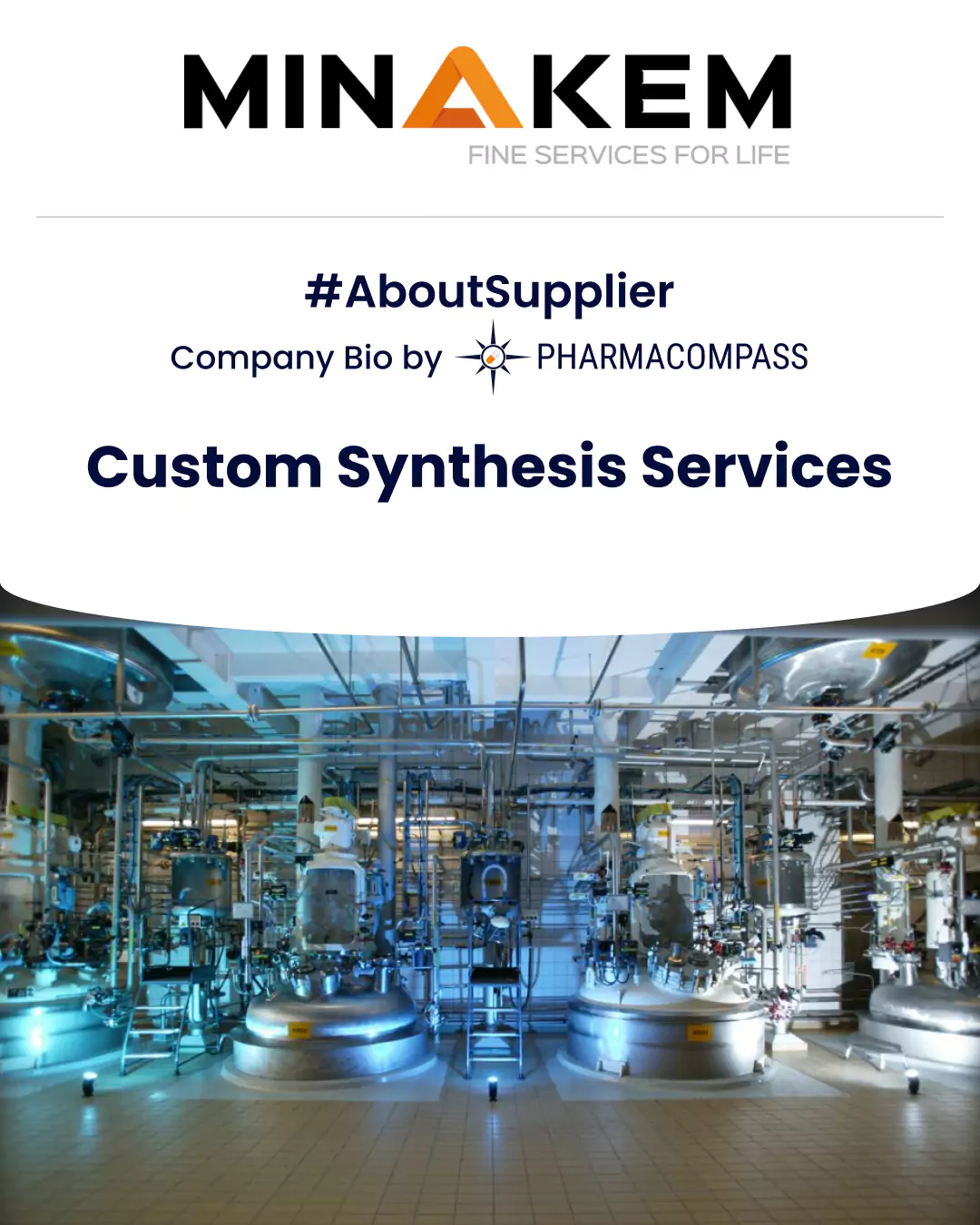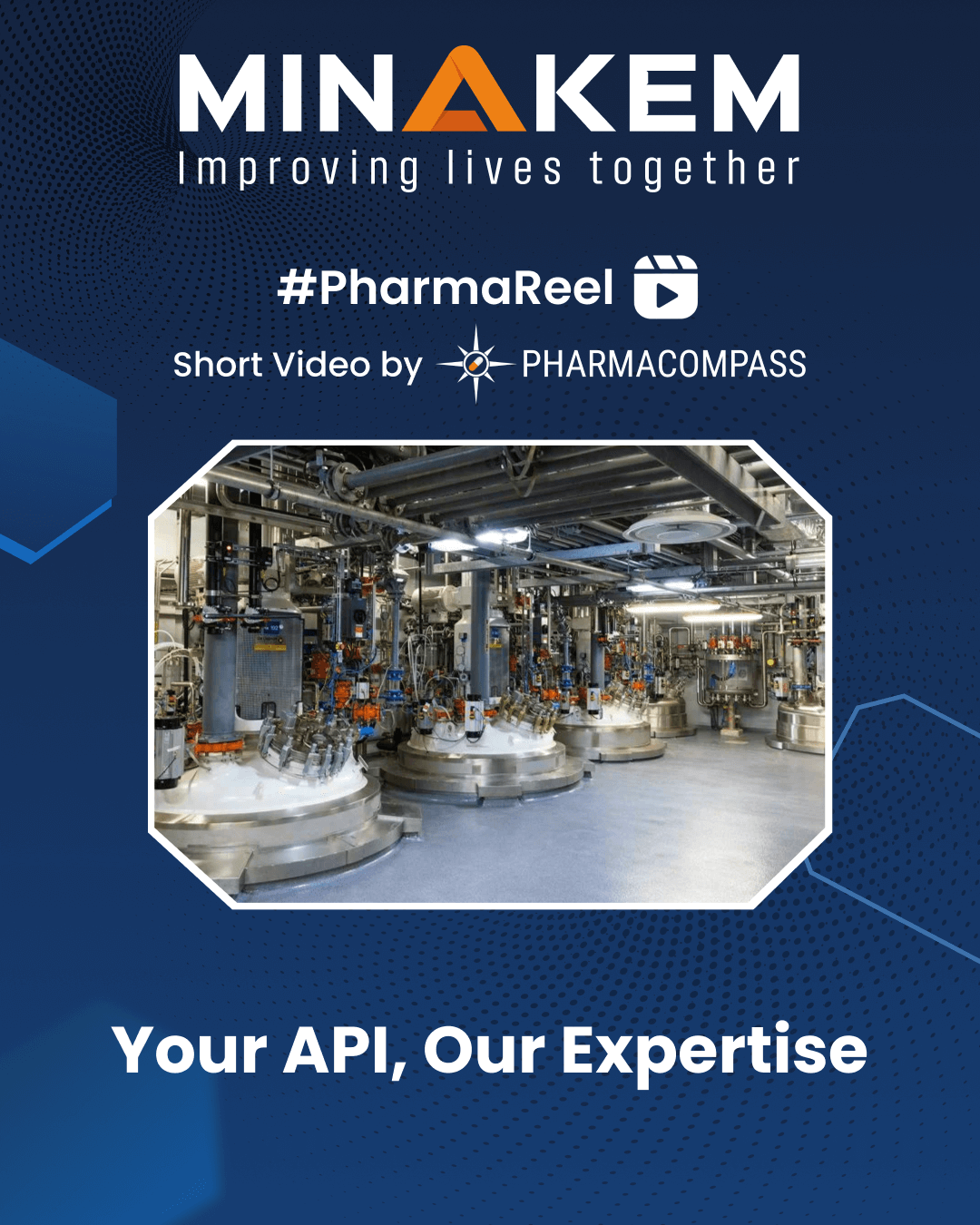
By PharmaCompass
2021-10-11
Impressions: 960
Looking for API custom synthesis services? Find Minakem, a CDMO offering custom APIs, intermediates, fine chemicals, HPAPIs, etc. on PharmaCompass.
Q1. What is API custom synthesis and what are the different methods of API synthesis?
API custom synthesis is the production of active ingredients in required quantities by custom synthesis providers according to customer specifications.
Custom synthesis services enable the exclusive synthesis of compounds such as custom APIs and intermediates, fine chemicals, small molecules, high potent APIs (HPAPIs), etc. on behalf of the customer, i.e., you can order a specific molecule that is only synthesized on your request on the scale, with the purity and with the specification or methods you require.
Custom API manufacturing or drug substance custom manufacturing is one of the options available for pharmaceutical companies requiring active pharmaceutical ingredients - APIs and intermediates, fine chemicals, reference standards, impurities or metabolites needed to launch their research and development projects.
Custom synthesis expertise is essential to pharmaceutical companies since many compounds such as custom APIs can sometimes be very difficult to find or hard to synthesize. Custom synthesis services provide the platform necessary for clients' to accelerate their projects to market.
The amounts of custom APIs produced during drug substance custom manufacturing or custom API manufacturing tend to be small, ranging from a few milligrams to about 10 kg or so, and can be carried out in-house or by contract active ingredient manufacturers offering contract API Manufacturing.
There is a big difference between the conditions used for small-scale custom synthesis of APIs and those used for standard multi ton per annum pharmaceutical manufacturing (commercial manufacturing of commercial scale APIs), just as strictly regulated cGMP manufacturing is different from those performed for R&D purposes.
The synthesis or pharmaceutical manufacturing of APIs is usually a complicated and multi-step process involving numerous chemical transformations and operations on a range of raw materials with different physical and chemical properties. Specialized custom synthesis & contract manufacturing expertise for contract API Manufacturing is needed to achieve the synthesis of these molecules.
There are various contract manufacturers, CMOs & CDMOs, in the pharmaceutical industry that offer API custom synthesis or custom API manufacturing services.
Some Methods of API Custom Synthesis
- Inorganic Synthesis
Inorganic synthetic drugs are inorganic compounds, such as aluminum hydroxide, magnesium trisilicate which are used for the treatment of gastric and duodenal ulcers are created via inorganic synthesis API pharmaceutical manufacturing methods.
Once raw materials have been obtained, there are dozens of different ways they can be used to manufacture inorganic compounds. A few of the most common methods for chemical production include liquefaction, fractional distillation, catalytic conversion, and calcination.
- Organic Synthesis
Organic synthetic drugs are mainly composed of drugs made by basic organic chemical raw materials, through a series of organic chemical reactions such as aspirin, chloramphenicol, caffeine, etc.
Organic compounds are created by employing sophisticated catalytic reactions and appropriately designed synthetic processes such as continuous flow chemistry, cyanation, halogenation. hydrogenation, etc.
- Organic Biosynthesis
Organic biosynthesis is an important strategy for API synthesis. Organic biosynthetic products are produced using multi enzyme synthesis in a single reaction vessel.
Q2. What are the steps involved in custom synthesis and manufacturing for APIs?
Custom synthesis and manufacturing for Active Pharmaceutical Ingredients (APIs) includes various processing steps, such as reaction, crystallization, separation and purification, filter cake washing, solvent swap, and solvent exchange. The steps involved in the custom synthesis and manufacturing of APIs is noted below.
Custom Synthesis & Manufacturing for APIs
Step 1: Reaction
During the reaction stage of API custom synthesis, raw materials selected during API development are mixed with solvents after which they undergo heating/cooling under regular in-process monitoring. The raw materials are treated in a reactor to obtain desired intermediates.
The API is not made by only one reaction from the raw materials but rather it becomes an API via several chemical compounds. The chemical compound which is in the process of becoming an API from a raw material is called an intermediate.
Step 2: Extraction & Purification
After the reaction phase of custom API manufacturing is complete, separation or extraction may begin. Separation processes are inevitably needed in the pharmaceutical industry, whether it is for purification of the active pharmaceutical ingredient (API) or intermediate, or for separating the biocatalyst post-biocatalysis, among others.
Extraction involving aqueous and organic phases, during drug substance custom manufacturing, separate inorganic and organic materials. Extraction thus leads to purification as it achieves significant partition between the desired product and existing impurities.
Various traditional methods are available, including chromatography and liquid-liquid extraction, that are continuously being improved. New methods have also been proposed, like membrane-based separations, which are common in biopharmaceutical drug manufacturing but not in small-molecule cGMP API manufacturing. Centrifugation, filtration, distillation, crystallization, and other combinations may also be used.
Step 3: Drying
Drying crystalline active pharmaceutical ingredients (API) is an important operation for the production of consistent, stable, free-flowing materials for formulation, packaging, storage and transport. Generally, the materials being dried during custom API manufacturing are solids that have been isolated by means of filtration following crystallization from water or from one or more organic solvents.
Step 4: Scale Up
As the development of a new drug product progresses, the batch sizes manufactured generally increase. The early First Time in Man (FTIM) clinical development commonly involves dosing to a small number of subjects, with the majority of the manufactured product often being required for stability studies and analytical testing. As one proceeds from formulation design to Phase I clinical trials during clinical development and subsequently through to Phase II & III, batch sizes generally increase.
Following a successful clinical development outcome, resulting in the granting of a marketing authorization, the batch sizes manufactured may be further increased to cover the market demands. Finally, after various tests are conducted to check the efficacy and safety of the active ingredient, it is ready for commercial manufacturing as a commercial scale API.
Q3. What are the challenges involved in API manufacturing?
Some Challenges Involved in cGMP API manufacturing
- Bad Raw Materials: Sourcing the highest quality raw materials whenever possible is a critical concern of CMOs carrying out custom synthesis and manufacturing of APIs, yet even with the most diligent sourcing and closest supplier alliances, there are many things that can go wrong.
It can fail to meet the specifications set forth in the Drug Master File (DMF) or could find foreign matter in the raw materials which could cause major damage to reactors and other equipment.
- Process Development & Route Optimization: The goal of continuous improvement of Quality standards and compliance with ever more rigorous Health Safety and Environment (HSE) regulations is a major preoccupation in cGMP API manufacturing.
Efficiency of process development services and route optimization for API production in a custom drug manufacturing organization relies on several key factors to be managed from the first stage of process development and route optimization through to full scale industrial validation and commercial manufacturing of commercial scale APIs.
- Low Yield: There are various impurities that may arise at different stages of API manufacturing. Purification by sedimentation, filtration, centrifugation, etc. may be performed to remove these impurities, however, if it is highly contaminated then purification will yield low quantities of fine chemicals, APIs and intermediates.
Using chemists with scientific expertise in handling such situations can reduce yield loss. Moreover, identifying impurity forming steps during cGMP API manufacturing and rectifying them can solve purification related low yield problems.
- Scale up/Tech Transfer: Scale up and technology transfer are associated with risks that need to be managed in order for a mg procedure to become a multi-kg process. Sometimes new impurities and issues that dont arise during early phase small scale development services can come up during late stage bulk drug substance manufacturing, which can be very costly.
Proper training of personnel, using advanced technologies, and spending more time assessing production and related issues during early stage small scale development can eliminate such problems plaguing API custom synthesis & contract manufacturing.
- Regulatory Problems: Not meeting regulatory requirements of cGMP manufacturing results in short timelines given by the regulatory agencies to rectify said issues, which can be difficult to cope with.
Following the cGMP manufacturing guidelines in its entirety during the drug manufacturing process and ensuring compliance throughout the development process can result in speedier and less complicated regulatory approvals.
Q4. What are the advantages of a pharmaceutical company contracting an external supplier for a compound?
Outsourcing is a common practice among both private and public organisations in the pharmaceutical industry. The process of outsourcing can be looked upon as a strategic move among businesses.
This process would try and decrease the overall cost of maintaining or increasing product quality. It may also allow firms to focus their concentration towards core activities of the business.
During the last three decades, researchers have supported this phenomenon as one of the most effective ways for cutting down costs.
Some advantages of outsourcing API synthesis to CMOs, CDMOs with custom synthesis expertise offering custom synthesis & contract manufacturing services are noted below.
Advantages of Outsourcing Custom Synthesis of APIs:
- The main benefits of outsourcing API custom synthesis are both economic and organizational. Strategic outsourcing can be a cost-effective alternative to in-house operations by providing access to the latest technology and/or sufficient operational capacity, avoiding costly capital investment, technical obsolescence and by decreasing depreciation.
- Strategic outsourcing tends to bring various benefits to the sponsor organization beyond cost savings, including the ability to focus on core competencies, increased productivity, and access to additional or specialized scientific expertise.
- Outsourcing API development and custom synthesis of APIs to contract manufacturers may result in optimization of the chemistry and processes, developing and documenting analytical methods in a format consistent with Quality Assurance (QA) requirements, outlining steps towards a regulatory pathway, etc.
- For high potent APIs (HPAPIs), the main advantage of outsourcing high potent APIs (HPAPIs) manufacture and API development is that it eliminates the need to invest in expensive containment infrastructure, which can also be complex to engineer, install and maintain.
- Contract manufacturers offering contract API Manufacturing have a good understanding of their industry and FDA - health authorities' activity, which they develop through years of experience. They can handle a project from start to finish, identify flaws and spot potential risks to quality agreements via regulatory intelligence monitoring throughout the supply chain.
- Outsourcing reduces the total time allotted for a drug product's project management. This in turn shortens the time to market the product, which translates to quicker income and a longer duration of its patented life enabling the company to introduce new products into the market and ultimately accelerating time to market.
Q5. Which custom synthesis and manufacturing services does Minakem offer?
Minakem has a fully GMP compliant and FDA inspected production site that can also provide full regulatory support. It offers custom synthesis, development and current Good Manufacturing Practice (cGMP) manufacturing of High Potency Active Pharmaceutical Ingredients (HPAPIs) and intermediates.
It also provides a complete range of custom development and manufacturing services for High Potent Active Pharmaceutical Ingredients - HPAPI (high potent CDMO services), custom synthesis from early-stage development to scale-up & commercial manufacture of high potent APIs with occupational exposure limits (OEL) down to 0.1?g/m³/shift (OEB class 6).
Minakem is a leader in certain technologies including flow reactions, hazardous chemistry, HPAPI technology, including cytotoxic compounds, and low-temperature chemistry. Custom synthesis services provide the platform necessary for clients' to accelerate their projects to market. Minakem offers a combination of innovative custom development and manufacturing solutions through a wide range of flexible assets, specialized technologies, and advanced process capabilities and contract manufacturing services for the synthesis of intermediates, APIs, and highly potent drug substances (HPAPIs) at all production scales.
The PharmaCompass Newsletter – Sign Up, Stay Ahead
Feedback, help us to improve. Click here
Image Credit : Biosynthesis, tech advancements by PharmaCompass is licensed under CC BY 2.0
“ The article is based on the information available in public and which the author believes to be true. The author is not disseminating any information, which the author believes or knows, is confidential or in conflict with the privacy of any person. The views expressed or information supplied through this article is mere opinion and observation of the author. The author does not intend to defame, insult or, cause loss or damage to anyone, in any manner, through this article.”






